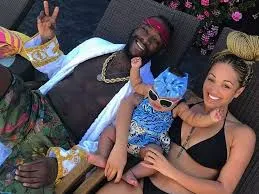Deontay Wilder’s Emotional Breakdown – A Champion’s Cry for Help

Deontay Wilder, one of the most renowned heavyweights in the world of boxing, recently opened up about his struggles with mental health and personal issues. The former WBC heavyweight champion admitted that he is feeling extremely “down” and “negative” due to the possibility of retiring from boxing and facing troubles in his family life.
A Career at a Crossroads
For years, Deontay Wilder has been a dominant force in the ring, known for his incredible punching power and tenacity. However, as he reflects on his career, Wilder has suggested that his days in the sport might be numbered. The thought of stepping away from boxing, a passion that has defined him for so long, has left him grappling with an overwhelming sense of uncertainty.

In a recent interview, Wilder expressed his concerns about losing his identity outside the sport. “Boxing has been my life for so many years,” he said. “The idea of letting it go feels like I’m losing a part of myself.” For many athletes like Wilder, the transition to life beyond professional sports can be daunting and emotionally taxing.
Family Troubles Add to the Strain
Adding to his turmoil, Wilder also revealed that his family life is under immense pressure. While he did not delve into specific details, it’s evident that the strain of his professional life has taken a toll on his personal relationships. The possibility of family breakdown is a source of great pain for Wilder, who has always been vocal about the importance of his loved ones in his life.
The balance between career and family is a challenge many professional athletes face. For someone like Wilder, who has devoted so much of his energy to excelling in the ring, finding equilibrium can be especially difficult. His candid admission sheds light on the mental struggles that accompany not just physical battles but also personal ones.
The Stigma Around Mental Health in Sports
Wilder’s openness about feeling “saddened” and “negative” highlights an important issue: the mental health challenges faced by athletes. Despite their physical prowess and public admiration, many athletes struggle with depression, anxiety, and self-doubt, especially when facing transitions like retirement or personal crises.
The stigma around mental health in sports has been slowly breaking down, thanks to figures like Deontay Wilder speaking out. His honesty can inspire others in similar positions to seek help and prioritize their well-being. For Wilder, acknowledging his struggles is the first step toward addressing them and finding a way forward.

What’s Next for Deontay Wilder?
The big question now is what lies ahead for Deontay Wilder. While retirement seems to be a possibility, fans around the world hope to see him return to the ring, even for one last fight. Wilder has also hinted at exploring other avenues outside of boxing, which could help him channel his energy and talents into new ventures.
As he navigates this challenging phase of his life, support from his fans, peers, and family will be crucial. Whether he decides to continue boxing or embark on a new journey, Wilder’s legacy as one of the most electrifying fighters of his generation remains intact.
The struggles of Deontay Wilder serve as a reminder that even the strongest individuals can face moments of vulnerability. The pressures of a successful career, combined with personal challenges, can weigh heavily on anyone. By sharing his feelings of being saddened and negative, Wilder not only brings attention to his own battles but also underscores the importance of addressing mental health issues in sports and beyond.
Whether Wilder chooses to fight again or step into a new chapter of his life, his courage in confronting these challenges head-on is commendable. His journey is a testament to the resilience of the human spirit and the importance of seeking balance in both professional and personal life.





